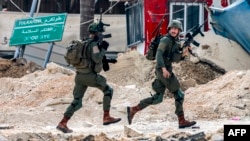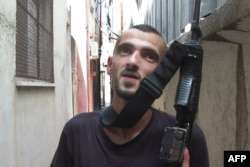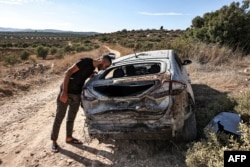Israel’s military said Thursday it killed five more Palestinian militants in the occupied West Bank, including a local commander, as it carried out a second consecutive day of counterterrorism operations.
Israel said the raids across the northern West Bank — which have killed a total of 16 people, nearly all militants, since late Tuesday — are aimed at preventing attacks.
The Palestinians said they see them as a widening of the 10½-month Israel-Hamas war in the Gaza Strip and aimed at perpetuating Israel's decadeslong military rule over the West Bank.
Meanwhile, Israel said it has agreed to at least three days of "humanitarian pauses" in Gaza fighting starting Sunday to allow United Nations health officials to administer polio vaccinations in the territory, the World Health Organization said.
Hamas welcomed the humanitarian pause for the polio vaccine program, Hamas official Basem Naim told Reuters Thursday.
Also on Thursday, the deputy U.S. envoy to the United Nations said Israel told the United States that a “communication error” between Israeli military units was to blame for shots that were fired at a World Food Program vehicle in Gaza.
"We have urged them to immediately rectify the issues within their system," Deputy U.S. Ambassador to the U.N. Robert Wood told a U.N. Security Council meeting on Gaza. "Israel must not only take ownership for its mistakes, but also take concrete actions to ensure the IDF does not fire on U.N. personnel again."
The World Food Program temporarily suspended movement of its employees across Gaza on Wednesday after at least 10 bullets struck one of its clearly marked vehicles while approaching an Israeli military checkpoint. No one was injured in the incident.
The recent Israeli raids drew alarm from the U.N. and neighboring Jordan, as well as from British and French leaders, who stressed during meetings in Paris the urgency of jump-starting stalled cease-fire negotiations to halt Israeli-Hamas fighting in Gaza.
The Islamic Jihad militant group confirmed that Mohammed Jaber, known as Abu Shujaa, was killed during a raid in the city of Tulkarem. He had become a hero for many Palestinians earlier in the year when he was reported killed in an Israeli operation only to make a surprise appearance at the funeral of other militants, where he was hoisted onto the shoulders of a cheering crowd.
Israel said Abu Shujaa was killed Thursday along with the four other militants in a shootout after the five had hidden inside a mosque. Abu Shujaa had been linked to numerous attacks on Israelis, including a deadly shooting in June, and was planning more, Israel said.
Israel launched search-and-arrest raids for hours on Thursday, with soldiers storming several northern West Bank militant strongholds, including the city of Jenin.
The army also said it uncovered caches of weapons, explosive devices and other military equipment inside a mosque in Fara'a, a Palestinian urban refugee camp in the foothills of the Jordan Valley, where the Israeli army said it struck and killed a group of militants traveling in a car. The number of people killed in that airstrike and their militant affiliations were not immediately clear.
United Nations Secretary-General Antonio Guterres called for an immediate halt to the raids, asking Israel's government to comply with its obligations under international law and to take measures to protect civilians.
"These dangerous developments are fueling an already explosive situation in the occupied West Bank and further undermining the Palestinian Authority," he said in a statement.
Israeli officials have been bracing for a promised retaliatory attack by Iran in response to the assassination of Hamas leader Ismail Haniyeh in Tehran last month.
But U.S. officials believe U.S. actions have convinced Iran to hold off.
"I think we certainly got into the headspace of Iran and how they're making their calculations," Pentagon deputy press secretary Sabrina Singh told reporters Thursday, citing the presence of two U.S. aircraft carrier strike groups in the region, as well as U.S. fighter jets and other military assets.
"We have said both very publicly and privately that we are there to protect our forces, and we'll, of course, always stand in the defense of Israel should we need to,” she said. "I think it has affected their decision-making."
"We're going to continue to take the steps that we need to, to send a message of deterrence,” Singh added. “We, the United States, do not want to see a broader regional war. And we've said that from the very beginning."
Israeli forces killed at least nine people Wednesday as the raids and airstrikes started in and around Jenin. The Hamas militant group said 10 of its fighters were killed.
Israeli troops and settlers have killed more than 650 Palestinians in the West Bank since the war in Gaza began last October, while Palestinian attacks have killed at least 19 Israelis.
Hamas has urged Palestinians in the West Bank to rise up, calling the raids part of a larger plan to expand the war in Gaza and blaming the escalation on U.S. support for Israel.
The war started after Hamas militants killed 1,200 people and captured about 250 hostages in an October 7 attack on Israel. Israel says it believes Hamas is still holding 108 hostages, about a third of whom are believed dead. Israel’s counteroffensive in Gaza has killed more than 40,000 Palestinians, according to the territory's health ministry, which does not distinguish between combatants and civilians in its count. In May, Israel estimated the death toll at around 30,000, and that most of the dead are combatants.
Nabil Abu Rudeineh, a spokesperson for Palestinian Authority President Mahmoud Abbas, condemned the raids as a "serious escalation" and called on the United States to intervene.
Meanwhile, the U.S. State Department released a statement Wednesday condemning what it characterized as "extremist [Jewish] settler violence in the West Bank."
The U.S. announced sanctions on the Israeli nongovernmental organization Hashomer Yosh, which, according to State Department officials, thwarted the return of Palestinian residents to their West Bank settlement earlier this year.
In response, Prime Minister Benjamin Netanyahu's office said, "Israel views with utmost severity the imposition of sanctions on citizens of Israel. The issue is in a pointed discussion with the U.S."
Israel captured the West Bank, Gaza and east Jerusalem in the 1967 Mideast war. The Palestinians want all three for a future state.
Israeli citizens have built scores of settlements across the West Bank, now home to more than 500,000 Jewish settlers. They have Israeli citizenship, while the 3 million Palestinians in the West Bank live under Israeli military rule, with the Palestinian Authority exercising limited control over population centers.
VOA's national security correspondent Jeff Seldin and U.N. correspondent Margaret Besheer contributed to this report. Some information came from The Associated Press, Agence France-Presse and Reuters.







